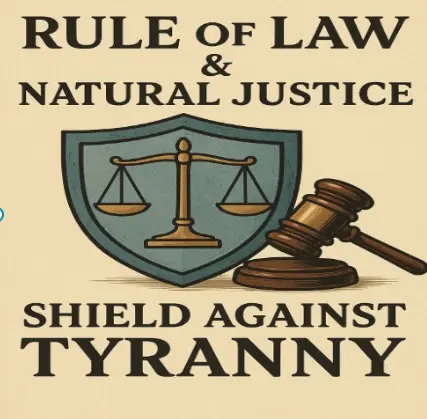
I believe that the law is the most important thing in the world today. I don’t mean the practice of lawyers. I mean the law itself. Normally I sleep well. If there’s one thing that can keep me awake at night it’s a vision, which I sometimes have, of this country being ruled by the wishes of its rulers and not by the rule of law.’
‘Could it happen here?’
‘Of course it could. It’s too bloody easy for a Government to panic and set the law on one side because it happens to be inconvenient. Temporarily, of course. They always mean to bring it back again — some time.’ –Flash Point, 1974” –Michael Gilbert
Recent debates, such as the Kerala case where Governors’ unlimited power to indefinitely hold back bills for assent was questioned, show that the rule of law remains as vital — and contested — today as ever. Rule of law basically states that no government or power of a men is above the authority of the law , which protects the rights of the peoples from being hampered by the state and also prevent the dictatorship.
The King is not the law but the law is king.The term “rule of law‟ is nowhere defined in the Indian Constitution. We can find that the term is though used frequently by the Indian courts in their judgements. For instance, an online search of the Supreme Court’s reportable judgments delivered between 1 January 1950 and 1 January 2010 resulted in 1,299 hits of the term ‘rule of law‘. There is no doubt that the rule of law pervades the Constitution as an underlying principle. In fact, the Supreme Court has declared the rule of law to be one of the “basic features‟ of the Constitution, so this principle cannot be taken away even by a constitutional amendment. As the Supreme Court declared Article 329-A as invalid since it abridges the basic structure of the Constitution.
Origin of rule of law
The concept of rule of law is not new to the contemporary world. It has ancient provision as it was their since so many ages and it was discussed by ancient Greek philosophers such as Plato, Cicero and Aristotle around 350 BC ago.
- Plato wrote: “Where the law is subject to some other authority and has none of its own, the collapse of the state, in my view, is not far off; but if law is the master of the government and the government is its slave, then the situation is full of promise and men enjoy all the blessings that the gods shower on a state”. To Plato, the law can guard against tyranny.
- Aristotle also endorsed the concept of Rule of law by writing that “law should govern and those who are in power should be servants of the laws.” Aristotle believed that tyranny is the “very reverse of a constitution.” . The law ought to be supreme over all.
- According to Cicero who is a Roman jurist stated that , “ We are servants of law in order to be free.”
- The formal origin of the word rule of law is attributed to Sir. Edward Coke, and is derived from French phase ‘la principe de legalite’ which means the principle of legality. The firm basis for the Rule of Law theory was expounded by A. V. Dicey and his theory on the rule of law remains the most popular.
Three pillars of Rule of Law
Dicey’s theory has three pillars based on the concept that “a government should be based on principles of law and not of men”, these are:
1- Supremacy of Law
- No one is above the law, whether it is the king, the prime minister, or any powerful person.
- Every individual always remains below the law.
- Law itself is the king of kings.
- Dicey postulated that the rule of law excludes wide discretionary authority in rulers.
- Rulers cannot create laws at will.
- They must govern strictly according to established laws.
And also Article 13 of indian constitution deals with this that lawmakers cannot abridge the fundamental rights of its citizens. The lawmakers need to give reasons that can be justified under the law while exercising their powers to make and administer the law. Most famously in the case of Kesavananda Bharati v. State of Kerala the Supreme Court held that the Rule of Law is an essential part of the basic structure of the constitution and as such cannot be amended by any Act of Parliament and thereby showing how the law is superior to all other authority of men.
2- Equality before law
- Prof. Dicey states that there must be equality before the law.
- All classes must be equally subject to the ordinary law of the land.
- This concept of the rule of law is codified in the Indian Constitution under Article 14.
- It is also present in the Universal Declaration of Human Rights, under the Preamble and Article 7.
- The principle of supremacy of law keeps a check on government law-making and administration.
- The principle of equality before law ensures justice in administering and enforcing laws. For example, the Supreme Court in Indira Nehru Gandhi vs. Raj Narain (1975) emphasized Article 14. The Court held that the rule of law embodied in Article 14 is part of the Constitution’s basic structure.
Therefore, it cannot be destroyed even by an amendment under Article 368 of the Constitution.
3- Predominance of Legal Spirit
Dicey believed that the above two principles are insufficient unless there is some enforcing authority and he believed that it could be found in courts The courts are the enforcers of the rule of law and they must be competent, impartial and free from all external influences. Thus the freedom of the judicial becomes an important pillar to the rule of law. Independent judiciary is a hallmark of constitutionalism. These three principles complements each other in one or other way.
The International rule of law
The United Nations is undertaking many efforts to strengthen the rule of law. . At the United Nations World Summit in September 2005, Member States unanimously recognised the need for “universal adherence to and implementation of the rule of law at both the national and international levels” and reaffirmed their commitment to “an international order based on the rule of law and international law.”
Kofi.A. Moon also emphasised the importance of rule of law internationally. As all persons, institutions , public and private, including the state itself are accountable to laws.
According to World Justice Project, as Every year it publishes Rule of law Index based on certain factors like absence of corruption, constraints on government power , criminal justice etc. India ranked 69 out of 128 countries. India fares poorly and needs improvement in various factors like corruption, providing criminal justice and many more.
Natural justice
“ Natural justice is a sense of what is wrong and what is right.”
Our Indian constitution has included the principles of natural justice as a golden thread. As the basic motive of natural justice is to promote justice, fairness , equity among the citizens. Natural Justice firmly grounded to Article 14 and 21 of Indian Constitution. The main purpose of natural justice is to prevent the act of miscarriage of justice.
Origin
The term natural justice was derived from the Roman word ‘jus-naturale’. And also According to the Bible, in the case of Eve and Adam, when they ate the fruit of knowledge, they were forbidden by the god. Before giving the sentence, eve was given a fair chance to defend himself and the same process was followed in the case of Adam too and its traces are often found in the early text of arthashastras as well.
Principles of natural justice
- Right to be heard
Accused or the person affected by certain decision should be given enough opportunity to be heard by the court or to be given fair trial and should be given a fair opportunity to express his point of view to defend himself. No one can deny the right of being heard. For example – In the High water mark case- Eurasian equipment and company limited vs. State of West Bengal: Under this case, all the executive engineers were blacklisted. Supreme Court held that without giving a valid and reasonable ground you cannot blacklist anyone and further he should be given a fair opportunity of being heard.
- Right against bias
This generally expresses that panel of expert should be biased free while taking the decision. The decision should be given in a free and fair manner which can fulfil the rule of natural justice. No one should be judged in their own case. And the jurisdiction should be biased free. Therefore, the necessity of this rule is to make the judge impartial and given judgement on the basis of evidence recorded as per the case.
For example – Muralidhar vs. Kadam Singh The court refused to quash the decision of Election tribunal on the ground that the chairman’s wife was a member of Congress party whom the petitioner defeated.
Conclusion
Natural justice and the rule of law underpin any just society. Together, they guarantee that no person, authority, or government is above the law, and no power can be acted upon arbitrarily, outside the law. From the principles of Plato, Aristotle, and Cicero, to the pronouncements of the Indian Supreme Court, the rule of law has provided a blanket of protection against tyranny. While corruption, ineffective criminal justice systems, and misuse of authority are everyday realities, a democracy’s greatest strength comes from reinforcing these means of protection. As long as there is the rule of law and natural justice, no tyranny will prevail against the dignity, rights, and freedom of the people.
FAQs on Rule of Law & Natural Justice
Q1. What is the Rule of Law?
Rule of Law means simply that no one (including the government) is above the law; namely all actions should be subject to predetermined principles of law. As a principle, Rule of Law embodies equality, fairness, and protection from arbitrary power.
Q2. Who has given the modern theory of Rule of Law?
The modern prescriptive theory of Rule of Law was popularized by A.V. Dicey in England and it rests on three pillars:
- Supremacy of law
- Equality before law
- Predominance of legal spirit (independent judiciary)
Q3. Is “Rule of Law” in the Constitution?
The term “Rule of Law” is not explicitly defined in the Indian Constitution but it is read as part of the Basic Structure Doctrine (Kesavananda Bharati v. State of Kerala, 1973) and in Articles 13, 14, 21 and 32.
Q4. What is Natural Justice?
Natural Justice means fair play in action and it embodies the principles of ‘no man should be condemned unheard’ and ‘no man should be a judge in his own case’.
Q5. What are the principles of Natural Justice?
- Nemo judex in causa sua – No man should be a judge in his own case. (Rule against Bias)
- Audi alteram partem – Hear the other side. (Right to be heard)
- Reasoned Decisions – Orders must be issued.
Q6. Is Natural Justice part of the Constitution?
Yes, while not explicitly stated, courts have associated natural justice with Articles 14 and 21 as extensions of the right to equality and right to life.
Q7. Give a recent example where Rule of Law/Natural Justice was applicable.
The Kerala Governor case (2023–24) raised the issue of Governors sitting on bills indefinitely and not providing assent, where the Supreme Court held that such delayed actions were arbitrary and against constitutional principles and the rule of law.
Q8. What is the distinction between Rule of Law and Rule by Law?
- Rule of Law → The law is supreme, the law ensures justice, and law limits arbitrariness.
- Rule by Law → The law is used as a mechanism by those in power, including to sanction unjust acts.


Good
Pingback: Ladki Bahin Yojana: The Rural Digital Divide - InfoTrigg
Pingback: Secularism in India: Historical Debates and Evolving Interpretations - InfoTrigg